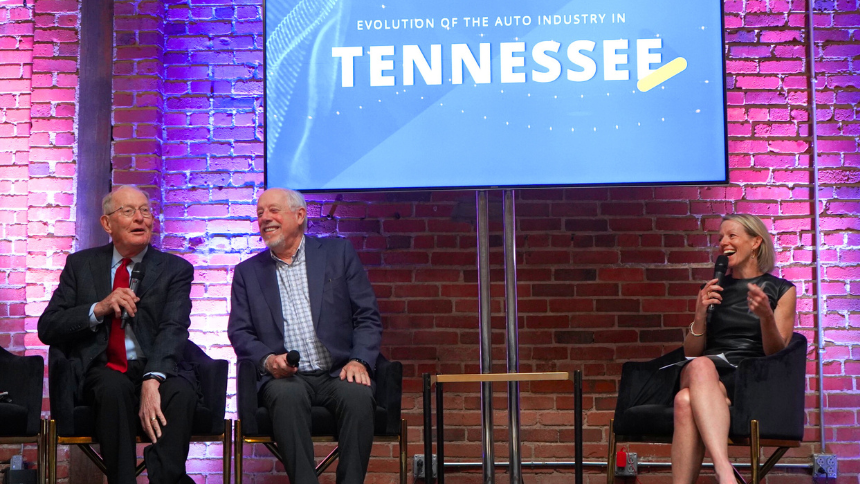
What did an African violet have to do with recruiting Nissan’s headquarters?
Naming a new variety after Carlos Ghosn's wife just might have helped land the corporate headquarters.
The evolution of the automotive industry over four decades was the final session in last week’s annual “Opportunities in Energy” program, and perhaps the sponsoring organization – the Tennessee Advanced Energy Business Council – saved the best of a great all-day program for the end.
Marianne Wanamaker, Dean of the new Howard H. Baker Jr. School of Public Policy and Public Affairs at the University of Tennessee, Knoxville, moderated the session that featured two former Governors who played critically important roles in that 40-year evolution. Lamar Alexander started the momentum, bringing the first Japanese manufacturing plant to Tennessee when Nissan announced on October 31, 1980, that it would build a plant in Smyrna. That was followed less than five years later when General Motors announced on July 26, 1985, the location of its only Saturn plant in Spring Hill.
Two Governors later, Phil Bredesen worked with Chattanooga and Hamilton County officials to successfully land Volkswagen’s return to U.S. manufacturing in a July 2008 announcement. Three years earlier, efforts begun during the latter days of the Don Sundquist administration were successful in landing Nissan’s corporate headquarters. More recently, Ford announced its BlueOval City that will occupy the West Tennessee Megasite in Haywood County, bringing four original equipment manufacturers (OEMs) to the Volunteer State.
In introducing the panel, Wanamaker noted that “it was a concerted effort over decades,” and “the recruitment of that industry has transformed communities.” The data certainly don’t lie. Tennessee is home to more than 900 automotive suppliers who, along with the OEMs, employ nearly 143,000 Tennesseans.
The two Governors shared their respective roles in helping grow the industry with Alexander relating something that happened during a dinner at the White House when Jimmy Carter was President. “He urged the Governors in attendance to convince the Japanese to make domestically what they sold here,” Alexander said. “We sensed the opportunity and focused on it.”
He recalled showing the head of Nissan a nighttime photo taken from space of the U.S. and the lights that shown in the dark that proved the point about the Volunteer State being in the population center of the country. That was certainly a selling point as were the fact that Tennessee is a Right to Work state, it had a robust road system, reliable power thanks to TVA, and aggressive but reliable leadership at the state level.
“We are a stable, business friendly state,” Alexander said, noting that attribute regardless of the party that occupied the Governor’s Office.
As Bredesen talked about the recruitment of both the Nissan headquarters and Volkswagen, he credited Alexander with building the foundation for follow-on success. He also observed that it was important to differentiate the state from others competing for the prize, in essence defining “what makes you unique.”
In a story we had not heard previously, Bredesen said that state officials learned that the then wife of Carlos Ghosn, head of Nissan, was a fan of African violets. There was a man in Nashville known for his expertise with African violets, so they sought his advice on the best gift to show Tennessee’s uniqueness. He suggested naming a brand new African violet Rita – that was Ghosn’s wife’s name, and so they did.
“I don’t think that on its own brought Nissan headquarters to Franklin,” Bredesen quipped, but it certainly did not hurt. In the case of Volkswagen, it was more challenging as incentives that were not such a big deal when Nissan’s manufacturing plant and Saturn were landed in the 1980s had become a much bigger deal in 2008.
“Tennessee’s Constitutional provisions on incentives nearly knocked us out,” Bredesen said, but Tennessee won in the end.
Looking to the future, Alexander reminded attendees that the automotive industry faces some challenging times. “All want to survive,” he said. Bredesen added that “finding a way to foster a collaborative environment” would be the biggest threat to the Volunteer State and its success as the industry shifts from gasoline-powered to electric vehicles going forward.
Little known fact: The two former Governors were “den fathers,” having sons that were in the same scout troop earlier in their lives. That’s just one of the things that caused us to observe how comfortable they seemed to be with each other.
Like what you've read?
Forward to a friend!

